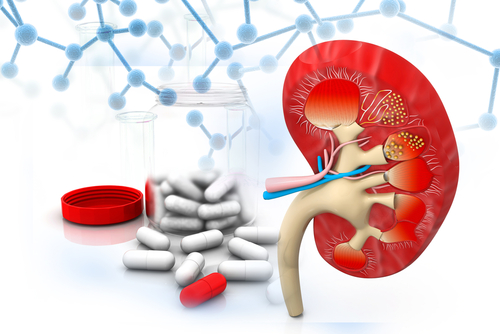Bardoxolone May Improve Kidney Function in Alport Patients, Phase 3 Results Suggest

Reata Pharmaceuticals’ investigational therapy bardoxolone methyl may effectively improve and preserve renal function in patients with chronic kidney disease caused by Alport syndrome, topline results from a Phase 3 clinical trial show.
The pivotal trial, called CARDINAL (NCT03019185), met both its primary and secondary objectives. Namely, patients showed improved kidney function after taking bardoxolone for nearly a year. In addition, these improvements were sustained after patients stopped taking bardoxolone for four weeks.
Based on these results, the company is now planning to file for marketing approval of bardoxolone as a treatment for chronic kidney disease in Alport patients in the U.S. and other countries.
“The first year results from the CARDINAL study are very promising. This provides hope to the entire Alport syndrome community that we could finally have the first therapy to treat this rare, genetic kidney disease,” Lisa Bonebrake, executive director of the Alport Syndrome Foundation, said in a press release.
Bardoxolone is a small molecule compound aimed at reducing oxidative stress and inflammation, which are critical contributors for the progressive deterioration of kidney function in Alport syndrome.
The Phase 3 CARDINAL trial included 157 patients with Alport syndrome, 15% of whom were children, who were recruited at about 50 study locations in the United States, Japan, Australia, and Europe. Participants were randomly assigned to take bardoxolone or a placebo for 48 weeks.
Results showed that the mean estimated glomerular filtration rate (eGFR) — which measures the ability of the kidney to clear waste products out of the blood — of patients taking bardoxolone increased by 4.72 mL/min/1.73 m2 compared with baseline, or before they started treatment, which was considered statistically significant. In comparison, those on the placebo experienced a significant decline of -4.78 mL/min/1.73 m2 after 48 weeks of treatment.
This difference in response represented an improvement of 9.5 mL/min/1.73 m2 in mean eGFR with bardoxolone over placebo.
Analysis of retained eGFR after 48 weeks of treatment followed by four weeks of no treatment with bardoxolone also showed the therapy’s significant protective effect on kidney function. Overall, patients treated with bardoxolone had a statistically significant improvement in mean retained eGFR of 5.14 mL/min/1.73 m2, compared with placebo.
When compared with baseline values, it was found that participants who took bardoxolone had a decline in mean retained eGFR of -0.96 mL/min/1.73 m2 at 52 weeks, although this was not considered statistically significant. On the other hand, patients given a placebo showed a decline of -6.11 mL/min/1.73 m2.
Researchers reported that similar efficacy at 48 weeks and 52 weeks was seen across multiple subgroups, namely among the children.
“The CARDINAL trial of bardoxolone is the first study in which a therapy halted the progression of chronic kidney disease in patients with Alport syndrome,” said Warren Huff, president and CEO of Reata. “On behalf of everyone at Reata, I would like to express my sincere appreciation to all of the patients, families, and investigators who are participating in the ongoing CARDINAL study.”
Bardoxolone was found to be generally well tolerated during the study, and showed a safety profile similarly to previous reports. A total of four patients (5%) receiving bardoxolone and 10 (13%) receiving placebo experienced a treatment-emergent serious adverse event (SAE). Nine participants (12%) receiving bardoxolone and four of those (5%) receiving placebo stopped treatment due to adverse events.
The most common adverse events among those taking bardoxolone were muscle spasms and higher levels of liver enzymes, which were generally mild to moderate in intensity.
“The Alport Syndrome Foundation is grateful to the patients who participated in the study. Their willingness to contribute to our understanding of bardoxolone is a gift to all patients facing the devastating impact that Alport syndrome can have on their lives, others with the disease in their family, and those who care about them,” Bonebrake said. “We also extend our deepest gratitude to the clinicians and their institutions for conducting this study and caring for these patients through the process.”







Leave a comment
Fill in the required fields to post. Your email address will not be published.